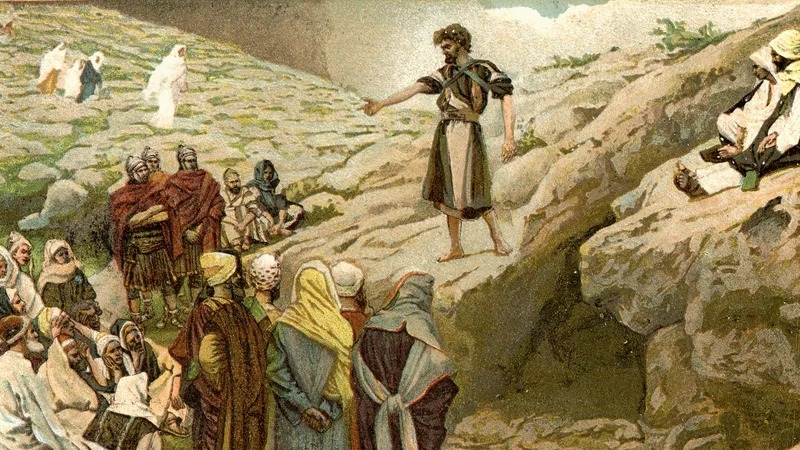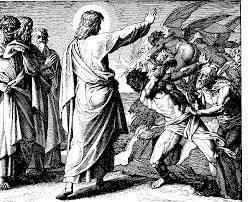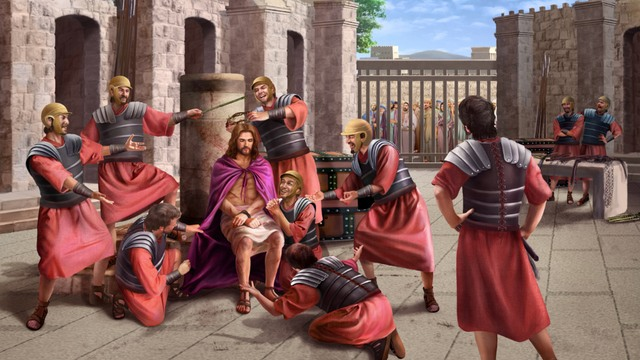𝗟𝘂𝗸𝗲 𝟭:𝟭𝟲-𝟭𝟳 “𝗔𝗻𝗱 𝗵𝗲 𝘄𝗶𝗹𝗹 𝘁𝘂𝗿𝗻 𝗺𝗮𝗻𝘆 𝗼𝗳 𝘁𝗵𝗲 𝗰𝗵𝗶𝗹𝗱𝗿𝗲𝗻 𝗼𝗳 𝗜𝘀𝗿𝗮𝗲𝗹 𝘁𝗼 𝘁𝗵𝗲 𝗟𝗼𝗿𝗱 𝘁𝗵𝗲𝗶𝗿 𝗚𝗼𝗱, 𝗮𝗻𝗱 𝗵𝗲 𝘄𝗶𝗹𝗹 𝗴𝗼 𝗯𝗲𝗳𝗼𝗿𝗲 𝗵𝗶𝗺 𝗶𝗻 𝘁𝗵𝗲 𝘀𝗽𝗶𝗿𝗶𝘁 𝗮𝗻𝗱 𝗽𝗼𝘄𝗲𝗿 𝗼𝗳 𝗘𝗹𝗶𝗷𝗮𝗵, 𝘁𝗼 𝘁𝘂𝗿𝗻 𝘁𝗵𝗲 𝗵𝗲𝗮𝗿𝘁𝘀 𝗼𝗳 𝘁𝗵𝗲 𝗳𝗮𝘁𝗵𝗲𝗿𝘀 𝘁𝗼 𝘁𝗵𝗲 𝗰𝗵𝗶𝗹𝗱𝗿𝗲𝗻, 𝗮𝗻𝗱 𝘁𝗵𝗲 𝗱𝗶𝘀𝗼𝗯𝗲𝗱𝗶𝗲𝗻𝘁 𝘁𝗼 𝘁𝗵𝗲 𝘄𝗶𝘀𝗱𝗼𝗺 𝗼𝗳 𝘁𝗵𝗲 𝗷𝘂𝘀𝘁, 𝘁𝗼 𝗺𝗮𝗸𝗲 𝗿𝗲𝗮𝗱𝘆 𝗳𝗼𝗿 𝘁𝗵𝗲 𝗟𝗼𝗿𝗱 𝗮 𝗽𝗲𝗼𝗽𝗹𝗲 𝗽𝗿𝗲𝗽𝗮𝗿𝗲𝗱.”
John the Baptist was to have the ministry of turning – more precisely REturning – people back towards their God. Commensurate with that was a reconciliation between the generations and repentance of sin to Biblical “wisdom” or righteous precepts. It was to be done to prepare the people for someone and something greater to come.
John would later point to Jesus as that “someone” to come. But inherent in this proclamation is a statement that the people of Israel were not ready to receive their Messiah. They had strayed (or were led astray) from following the ways of the Lord. In occupied, oppressed Israel, the compromised state of mind and path in life is understandable. It’s remarkable the God chose this time to send John the Baptist and Jesus.

Part and parcel of John’s message was that oppression and discouragement were no excuse for not following the Lord. Indeed, there was a thriving and overcoming implicit in the ministry of the suffering and dying Messiah. THAT was not expected by anyone in first century Israel. What the people expected and wanted was a Messiah who would throw off Roman rule and re-establish Israel as THE world power. Jesus would indeed conquer Rome, though not through military/political power. John’s ministry prepared the people for righteousness in the midst of suffering and overcoming despite trial and opposition.
Where do I explain away my ethical shortcomings and compromises with “what I’ve been through”? Where do I do that for groups of people of whom I’m a part? It doesn’t wash and it doesn’t mesh with the gospel I profess to follow. Perseverance and patience (literally “longsuffering” in the original Greek) are products of following Jesus. Do I pray for them to develop and be lived out in my life? If not, I need to.
𝗛𝗲𝗯𝗿𝗲𝘄𝘀 𝟭𝟮:𝟭𝟭 𝗡𝗼 𝗱𝗶𝘀𝗰𝗶𝗽𝗹𝗶𝗻𝗲 𝘀𝗲𝗲𝗺𝘀 𝗽𝗹𝗲𝗮𝘀𝗮𝗻𝘁 𝗮𝘁 𝘁𝗵𝗲 𝘁𝗶𝗺𝗲, 𝗯𝘂𝘁 𝗽𝗮𝗶𝗻𝗳𝘂𝗹. 𝗟𝗮𝘁𝗲𝗿 𝗼𝗻, 𝗵𝗼𝘄𝗲𝘃𝗲𝗿, 𝗶𝘁 𝗽𝗿𝗼𝗱𝘂𝗰𝗲𝘀 𝗮 𝗵𝗮𝗿𝘃𝗲𝘀𝘁 𝗼𝗳 𝗿𝗶𝗴𝗵𝘁𝗲𝗼𝘂𝘀𝗻𝗲𝘀𝘀 𝗮𝗻𝗱 𝗽𝗲𝗮𝗰𝗲 𝗳𝗼𝗿 𝘁𝗵𝗼𝘀𝗲 𝘄𝗵𝗼 𝗵𝗮𝘃𝗲 𝗯𝗲𝗲𝗻 𝘁𝗿𝗮𝗶𝗻𝗲𝗱 𝗯𝘆 𝗶𝘁.








